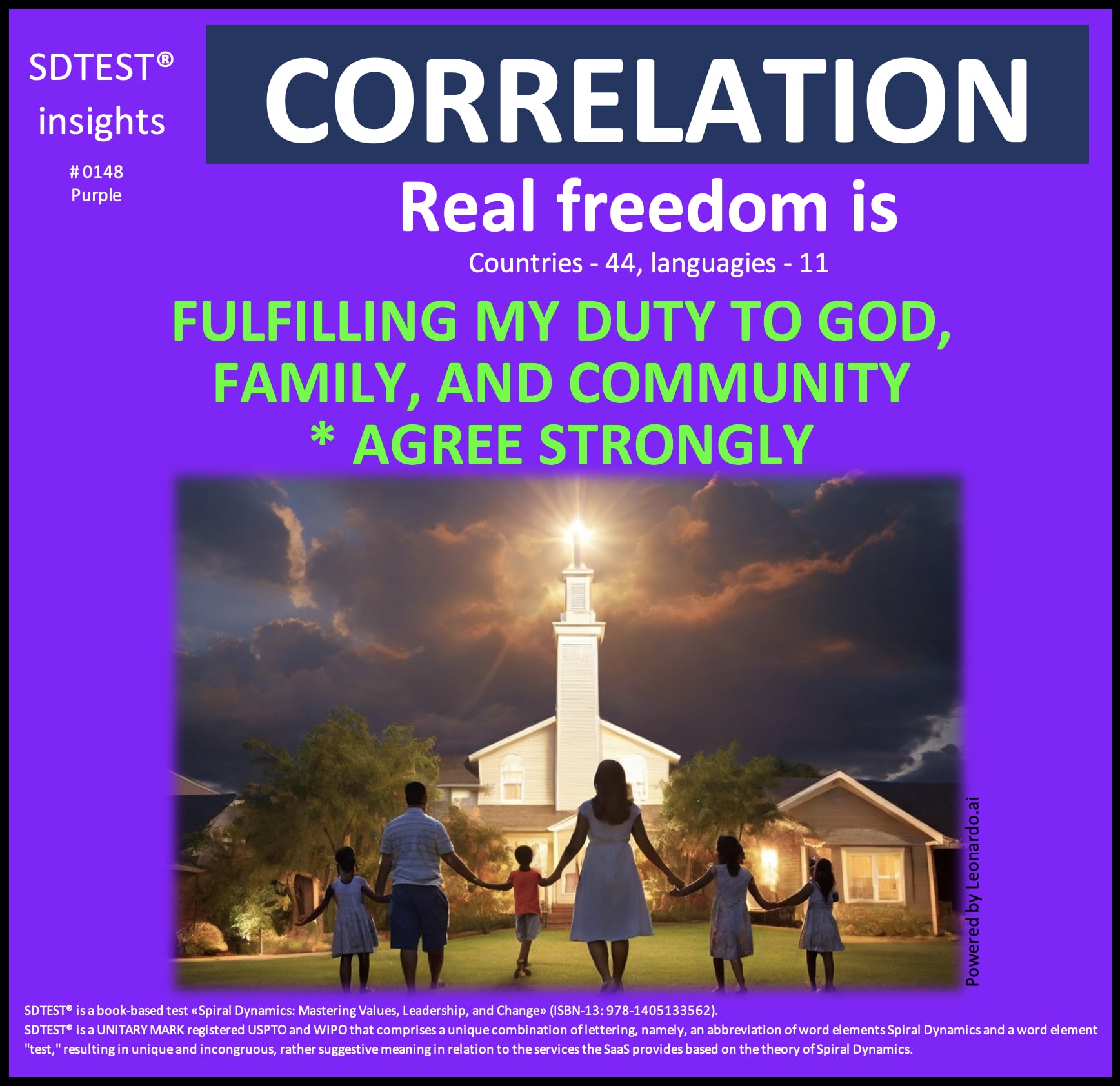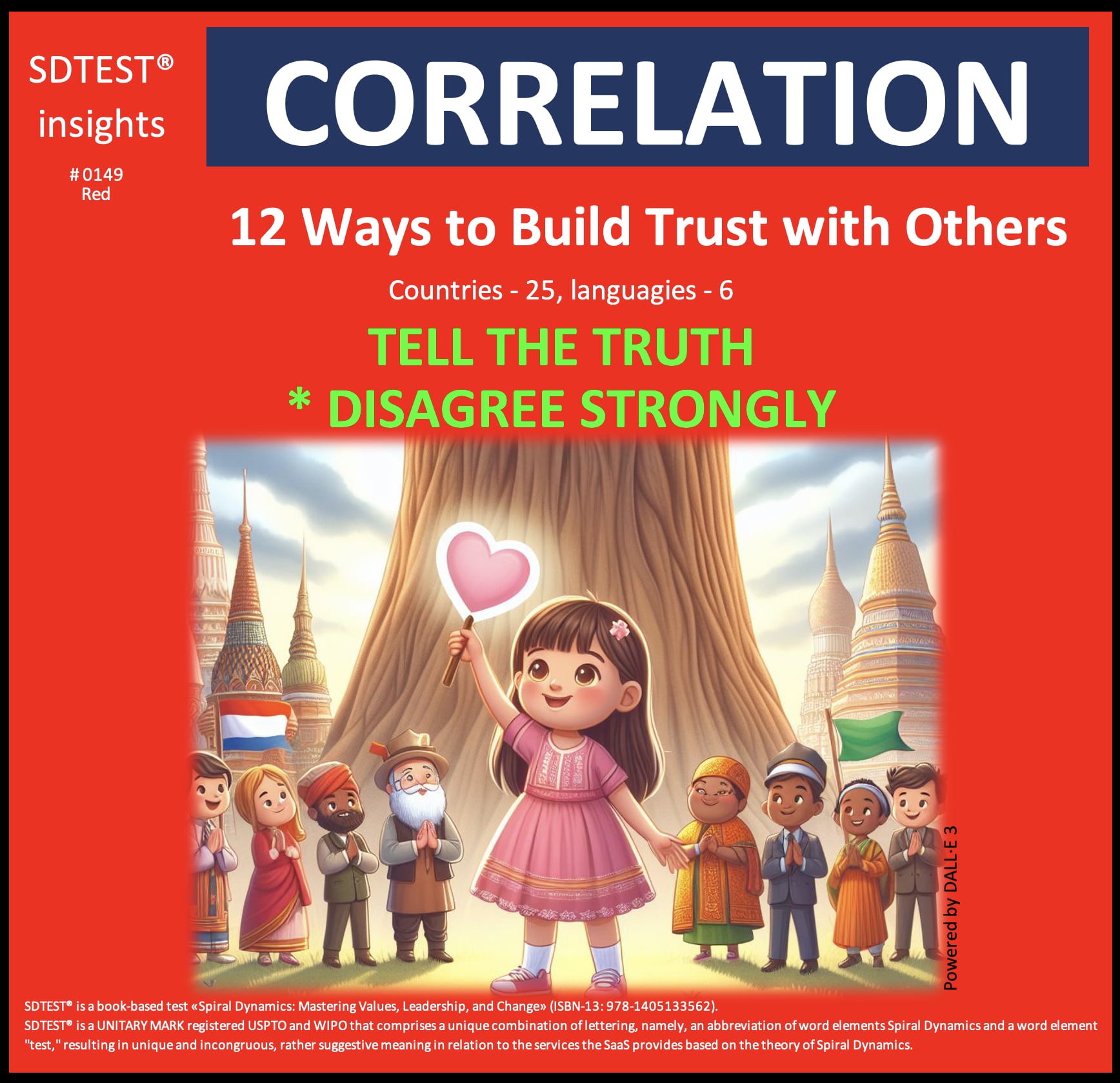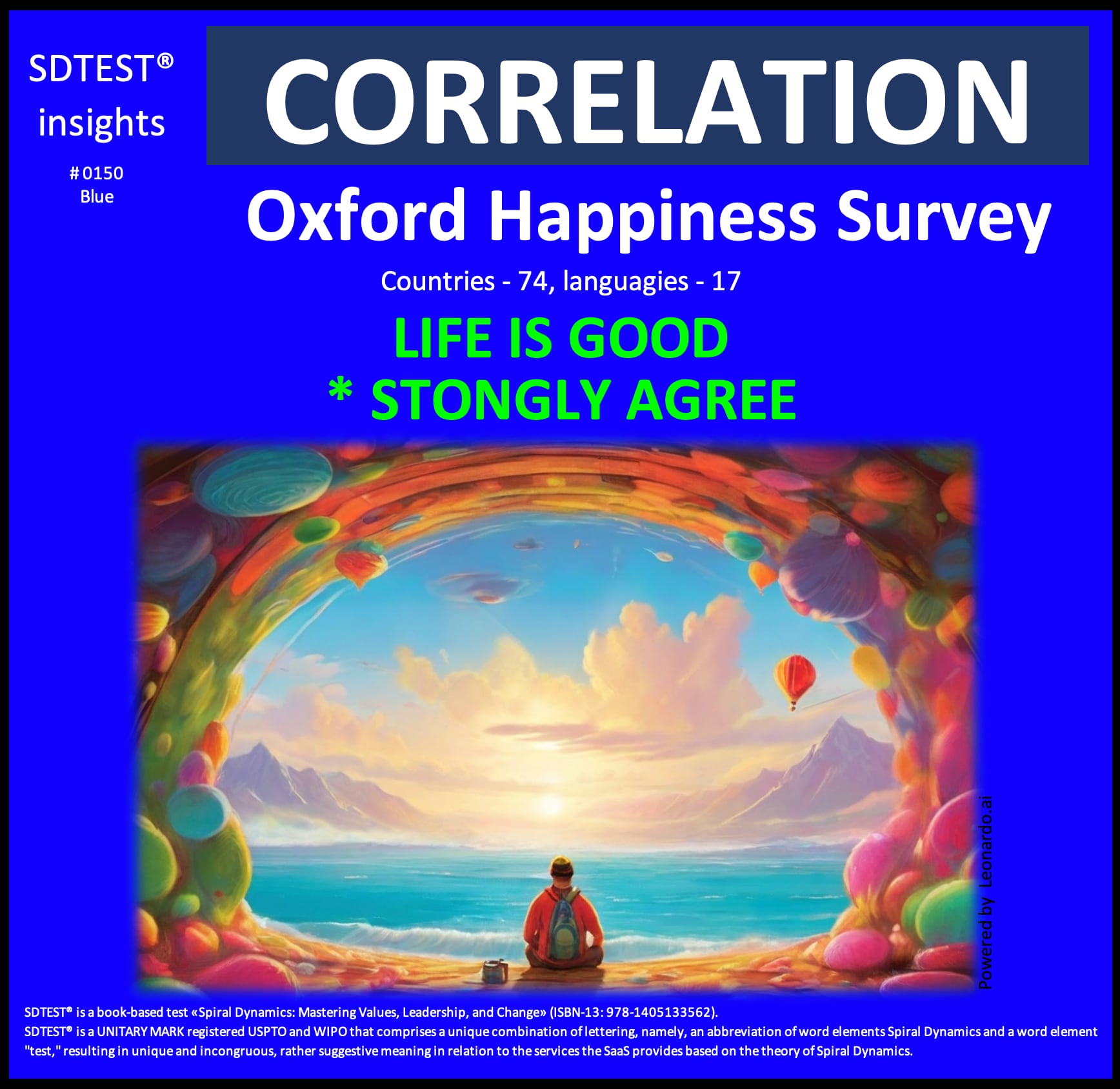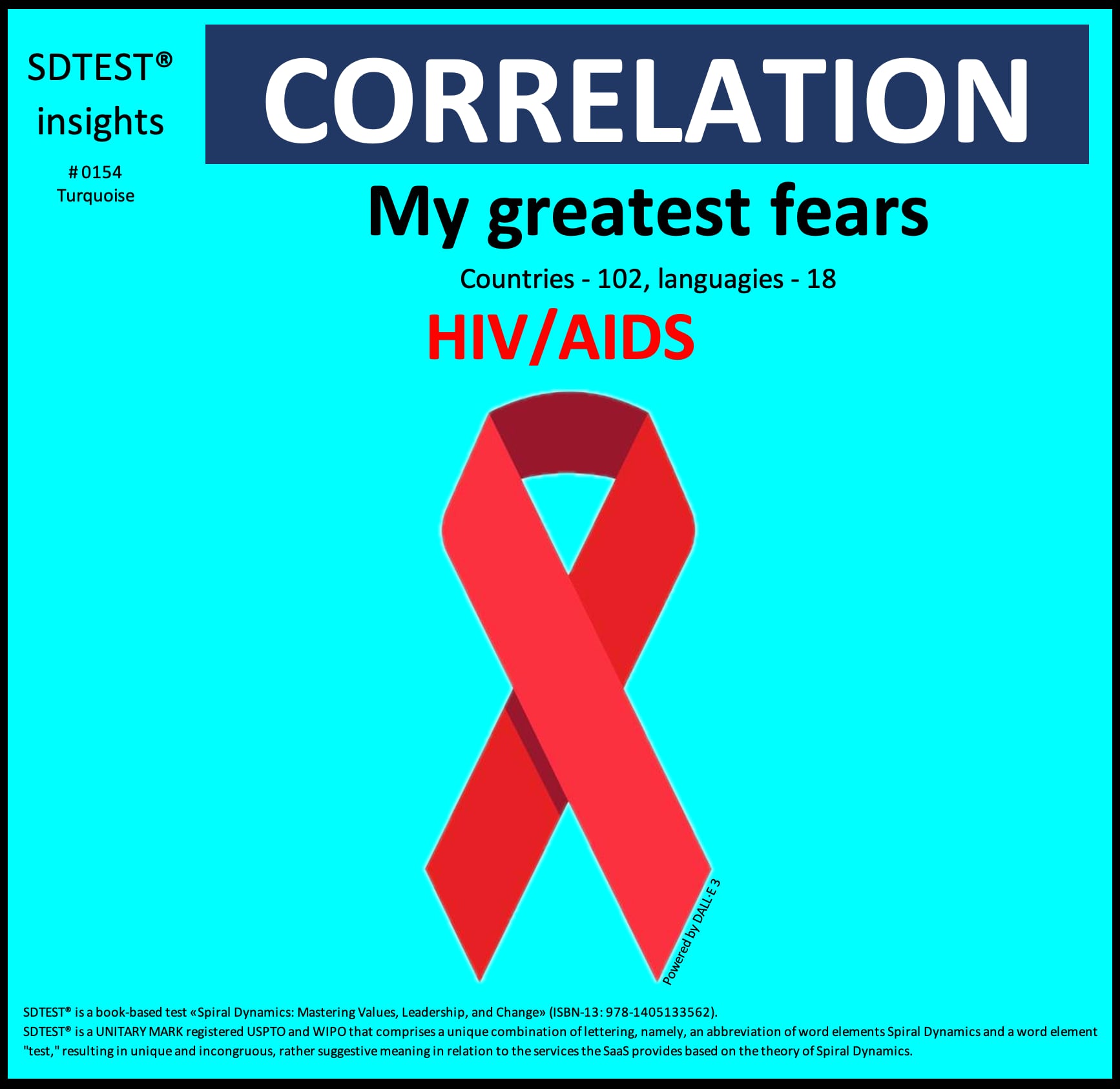SDTEST® has 33 different VUCA polls that calculate the 12,299 correlation values between stages of development according to the theory of Spiral Dynamics and answer options of these 33 polls.
We invite curiosity about the systemic mechanisms behind this correlation. There may be hidden variables that provide alternative explanations.
In our analysis of the poll "Real Freedom Is," we found an intriguing positive correlation that warrants closer examination:
0.3169 between the Fulfilling my duty to God, family, and community / Agree strongly and the Purple stage.
The critical value of the correlation coefficient for a normal distribution, by William Sealy Gosset (Student) r = 0.1547. This positive correlation of 0.3169 meets the reliability criteria but does not necessarily imply causation.

This positive correlation of 0.3169 between strongly agreeing that real freedom lies in fulfilling the duty to the sacred trio of God, family, and community and alignment with the Purple value system reveals deep insights into the roots of belonging, meaning, and spiritual concordance.
Let us explore what resonances it may carry at the individual, team, and organizational levels:
Individual Perspective:
For those enmeshed in the Purple frequency, the idea of true freedom being tethered to solemn obligations to divine, kin, and collective realms is utterly organic. Their self-identity is inextricably interwoven with the ancient mythic, ritualistic threads that have bound their ancestors for generations. Freedom is not an expression of radical individualism but an awakening into one's destined role within the excellent cosmic order. By attuning every fiber to these sacrosanct callings, the Purple individual experiences the liberty of becoming an essential stitch in an infinite tapestry - relinquishing ego in sacred reunion with all that is.
Team Perspective:
In Purple Teams, intense allegiance to faith, bloodline, and the primordial "us" is the sacred bedrock, allowing the collaborative whole to transcend the sum of its parts. Freedom is a collective inheritance earned through the ages of ancestors' sacrifices in service of perpetuating ancestral ways. Team members reignite the essence by ceremonially renewing their vows to these supreme duties, allowing them to harmonize as one resilient, consecrated organism knitted together by fate's grand design. For the Purple clan, embracing prescribed roles IS the emancipation that elevates them into heroic custodians.
Organizational Perspective:
Businesses steeped in Purple currents tend to be traditions unto themselves - zealously guarding their unique, generations-spanning legacies, lore, and leavening rituals. Employees represent workers and living vessels through which the organization's venerated covenant with its hallowed past flows. True liberty is not autonomy from tradition but the cultivation of profound pride in selfless service to upholding its most sacred mysteries, values, and symbolic lineage. Only by religiously upholding these sacrosanct duties can the corporate chalice continue replenishing its transcendent, mythical essence.
At its core, this correlation symbolizes the profound humility of belonging to a cause far more significant than oneself. It exemplifies the deep fulfillment and freedom in ritualistically surrendering personal will to duties sanctified by epochs of ancestors' devotion, reverence, and sacrifice. To the Purple spirit, the most intoxicating liberty knows your place in the eternal song - self subsumed into a timeless spiritual symphony.
0.3049 between the Tell the truth (Honesty lays the foundation for trust) / Disagree strongly and the Red stage.
The critical value of the correlation coefficient for a normal distribution, by William Sealy Gosset (Student) r = 0.2351. This positive correlation of 0.3049 meets the reliability criteria but does not necessarily imply causation.

This positive correlation of 0.3049 between disagreeing with the importance of honesty for building trust and alignment with the Red value system lays bare some provocative truths about power dynamics, self-interest, and unfettered authenticity.
Let's explore what it may reveal operating at the individual, team, and organizational levels:
Individual Perspective:
Those firmly in the thrall of the Red vMeme tend to be brazen truth-tellers, unconcerned with social niceties or repercussions. Their words flow unfettered, direct expressions of their impulses and desires in the moment. To the Red personality, honesty is less a strategic virtue for engendering trust and more a byproduct of their unselfconscious self-assertion. In their uncompromising realness, they may reject the notion that truth-telling should be a means to any other end beyond authentic self-expression. This dismissal of honesty-as-tactic could reflect the Red frequency's innate revolt against all forms of manipulation or inauthentic pretense.
Team Perspective:
In Red team cultures, overt dominance hierarchies and displays of raw power tend to displace niceties like "honesty" and "trust-building." The unvarnished truth of each member's standing, influence, and status is reflected in their ability to achieve their wants through sheer force of will, often regardless of truth or ethical observation. Trust is less about honesty and more about respecting the assertive social order and complying with those at the apex. Disagreeing that honesty matters may reinforce the Red team's primal law- the alphas' unleashed self-interest reigns supreme over superficial virtues.
Organizational Perspective:
Red organizations are essentially dominance hierarchies writ large, their priorities rooted in exercising power over resources, rivals, and even their people. In this ruthlessly Darwinian context, honesty and trust take a back seat to unflinching self-interest and the willingness to employ any means necessary to achieve supremacy. Disagreeing that honesty is essential may simply reflect the overriding Red paradigm that empires are built on the unrestrained expression of ambition, not on fragile human constructs like trust. To the Red organization, brutal transparency about its ravenous hunger for domination is its most truth.
In essence, this correlation could expose the simple wisdom that in the primal realm of the Red vMeme, truth, and trust are far less vital than the sovereign rights of the unfettered ego to assert its desires through sheer visceral dominance. It reminds us that at the core of our human code resides an amoral force - the primal lust for power, self-gratification, and control- representing our most excellent creative fire and our most dangerous madness. How we master and transcend this Red impulse determines our trajectory as a species.
In our analysis of the poll "Oxford Happiness Survey," we found an intriguing positive correlation that warrants closer examination:
0.0632 between the Life is good / Strongly Agree and the Blue stage.
The critical value of the correlation coefficient for a normal distribution, by William Sealy Gosset (Student) r = 0.0568. This positive correlation of 0.0632 meets the reliability criteria but does not necessarily imply causation.

This positive correlation of 0.0632 between strongly agreeing that "life is good" and resonance with the Blue value system offers fascinating insights into the psychological roots of happiness grounded in order, structure, and moral certitude.
Let's explore what it may reveal operating at the individual, team, and organizational levels:
Individual Perspective:
For those firmly anchored in Blue consciousness, finding happiness is intricately tied to living in alignment with immutable codes and absolutes ordained by higher authorities. The positive correlation suggests that individuals at this level derive profound fulfillment and contentment from following prescribed paths of proper conduct blessed by divine/civic doctrine. Their sense of life being "good" flows from the security of knowing one's place in a just, divinely ordered universe – a conviction that adhering to duty brings cosmic rewards. Self-actualization is subordinated to the primacy of obeying sacred edicts from the ultimate sovereign.
Team Perspective:
Blue team cultures tend to be hierarchical, with members' purpose derived from their role obligations within an overarching mission sanctioned by dogma. This correlation may indicate that teams steeped in Blue find happiness through the well-oiled enactment of protocols, procedures, and "holy" processes that have been hallowed over time. A collective sense of life being good arises from the well-orchestrated performance of formalized workflows distributing tasks and duties via established chains of command. Compliance with sanctioned systems supersedes individual expressions of happiness separate from the group.
Organizational Perspective:
Enterprises grounded in Blue values operate as highly regulated institutions governed by elaborate codes, laws, and "holy" doctrines. This positive correlation suggests that within their cultural DNA lies a proclivity for leaders/members to find happiness in the steadfast adherence to time-honored rules, traditions, and moral framework defining their existence. Life is indeed "good" when the sanctity of the organizational dogma and hierarchy is vigorously maintained. Thus, the organization's happiness arises from its role as both enforcer and embodiment of the inviolable legal/ethical "true way" unto itself.
This intriguing correlation encapsulates the deep human yearning for a life of happiness as "goodness" defined not by subjective emotional states but rather through the sense of order, certainty, and moral-cosmic destiny instilled by inflexible belief structures and eternal, immutable laws. It reveals the profound comfort and fulfillment individuals and collectives can derive from subsuming their wills to overarching narratives sanctifying the "one true path" to have been graced with.
In our analysis of the poll "Psychological Wellbeing" (by Carol D. Ryff), we found an intriguing positive correlation that warrants closer examination:
0.1718 between the Positive relations with others. Maintaining close relationships has been difficult and frustrating for me / Strongly disagree, and the Orange stage.
The critical value of the correlation coefficient for a normal distribution, by William Sealy Gosset (Student) r = 0.0526. This positive correlation of 0.1718 meets the reliability criteria but does not necessarily imply causation.

This positive correlation of 0.1718 between strongly disagreeing that maintaining close relationships is difficult, and alignment with the Orange value system, surfaces fascinating perspectives on how rational, goal-oriented mindsets approach human connection.
Let's explore what it may reveal at the individual, team, and organizational levels:
Individual Perspective:
Those operating firmly in the Orange frequency often evaluate relationships through a pragmatic, almost scientific lens focused on efficiently attaining objectives. The positive correlation suggests Orange individuals view warm interpersonal bonds not as fuzzy sentiments but as vital means to tangible ends - social currency facilitating career growth, creative collaboration, influence, and resource exchange. By confidently mastering persuasion, negotiation, and strategic networking skills, the self-directed Orange persona stays adeptly in touch with key human connective tissues, oiling their ambition. Close relationships aren't frustrating burdens but technocratic assets in their rational pursuit of success.
Team Perspective:
Orange team dynamics tend to be meritocratic, with members united by shared goals, systems, and quantifiable Key Performance Indicators. This correlation may signify that high-performing Orange teams catalyze positive interpersonal dynamics by aligning each contributor's unique talents/responsibilities into an optimized workflow, unseating relational frustrations. The teams that disagree about relationship challenges have codified human "fitting" as an engineering deliverable - channeling empathetic/operational intelligence to keep cross-functional interactions flowing smoothly. For them, organizational design is a precise science of resolving relational dissonance.
Organizational Perspective:
In Orange-driven enterprises, relationships represent networks of leverage that must be continually analyzed, mapped, and pressure-tested for optimal performance. This correlation may reveal that Orange corporations systematically nurture positive connections by strategically positioning roles/incentives to create self-reinforcing human circuits of competence, ambition, and mutual benefit. These companies recognize that to thrive in fluid markets, and self-interest must be harnessed through carefully architected social matrices. Their denial of relational struggle reflects the rigorous application of scientific interpersonal design principles.
At its core, this intriguing correlation symbolizes the quintessentially rational, tech-minded Orange approach to relationships—treating human connectivity not as a mystical force but as an empirical variable to be isolated, studied, modeled, and optimized. Those adeptly applying the methods of science to oil their key human relationships find professional kinship and success flowing in abundance, unencumbered by interpersonal frustrations. Mastery of social systems design may well be the new emotional intelligence.
In our analysis of the poll "Does ageism exist?" we found an intriguing positive correlation that warrants closer examination:
0.1087 between the Age group 55-59 and the Green stage.
The critical value of the correlation coefficient for a normal distribution, by William Sealy Gosset (Student) r = 0.0814. This positive correlation of 0.1087 meets the reliability criteria but does not necessarily imply causation.

This positive correlation of 0.1087 between those in the 55-59 age group and alignment with the Green value system hints at some intriguing perspectives on the interplay between wisdom, holistic thinking, and our collective evolution.
Let's explore what insights it may offer through the lenses of the individual, team, and organizational contexts:
Individual Perspective:
As one enters their late career/pre-retirement years, the Green frequency's emphasis on unity consciousness and systemic interconnectivity can resonate profoundly. This life stage affords a panoramic vantage point from which to perceive the larger ecology we're all woven into - a clarity that more materialistic and career-centric mindsets may obscure in earlier years. Additionally, having witnessed the generational cycles of human folly and progress, the 55-59 woman or man may be instinctively drawn toward Green's ethos of inclusivity, patience, and regard for the entire human family.
Team Perspective:
High-performing teams unified by the Green paradigm tend to transcend typical corporate silos and hierarchies in favor of a more organic, egalitarian "flatterarchy." This correlation may signify that teams striving for this engaged, collaborative dynamic are well-served by including 55-59 cohort members. Their life experience fosters the vulnerability, ego-surrender, and nuanced facilitation skills critical for co-creating authentic spaces of shared understanding and mutual empowerment. Their Green resonance elevates the team into a living instance of the whole they're serving.
Organizational Perspective:
Enterprises anchored in the Green-ethos tend to focus less on traditional business metrics and more on their role as participatory stewards of global human/ecological systems. This positive correlation could reflect that organizations embodying this world-centric map intentionally engage members of the 55-59 demo - seeing their developmental gravitas as sage conduits for activating the unified field perspective required. In essence, these "Elders" become living embodiments of the values motivating the company - wisdom-keepers reminding all that sustainable abundance arises through reverence for the entire web of life.
This intriguing correlation may unveil the profound human potential that arises when matured souls enriched by life's trials and joys move into vibrational coherence with Green's harmonic unified field awareness. In merging their cultivated personal gravitas with Green's radical embrace of pluralism and ecology, these "Elders" model the path toward individual/collective transcendence into the next holistic turn of our species' evolutionary spiral.
In our analysis of the poll "Empathy is," we found an intriguing negative correlation that warrants closer examination:
-0.1673 between the Empathy is really listening to what others have to say / Strongly Disagree and the Yellow stage.
The critical value of the correlation coefficient for a normal distribution, by William Sealy Gosset (Student) r = 0.0773. This negative correlation of -0.1673 meets the reliability criteria but does not necessarily imply causation.

This negative correlation of -0.1673 between disagreeing that "Empathy is really listening" and being associated with the Yellow value system, actually implies a positive correlation (the negative correlation of -0.1673 and disagreeing together realize the positive effect) between the Yellow frequency and agreeing that empathy fundamentally involves deep listening.
When seen through this corrected perspective, the correlation reveals powerful insights:
Individual Perspective:
Those operating from the integrative Yellow level have transcended ego and can hold multiplicities of truth. For them, empathy is the ultimate act of presence—authentically attuning to another's depths through rapt, nonjudgmental listening. This listening suspends one's own storytelling to become a tuning fork resonating with another's harmonics of being.
Team Perspective:
High-functioning Yellow teams are essentially resonant fields allowing the free interplay of diverse perspectives. Deep listening becomes the core competency, with each member's listening unlocking new additive streams of collective intelligence. Eschewing dominance in favor of an egalitarian "flatterarchy," these teams embody radical empathy.
Organizational Perspective:
Enterprises anchored in Yellow understand that perpetual evolution arises from an ongoing listening process across all stakeholders. Their empathic receptivity enables perspective-transcendence and meta-learning as an organism. Like dynamic tuning systems, they continually re-calibrate by listening to disruptive voices unveiling emerging opportunities.
In essence, this positive correlation between the Yellow frequency and prizing empathic listening represents one of the core capacities differentiating post-conventional consciousness. It reflects the ability to hold the entire orchestra of diverse worldviews in a unified resonance field of deep attending. From this generative listening flow insights catalyzing harmonies unachievable through any single instrumental line.
In our analysis of the poll "My Greatest Fears," we found an intriguing negative correlation that warrants closer examination:
-0.1732 between the HIV/AIDS and the Turquoise stage.
The critical value of the correlation coefficient for a normal distribution, by William Sealy Gosset (Student) r = 0.035. This negative correlation of -0.1732 meets the reliability criteria but does not necessarily imply causation.

This negative correlation of -0.1732 between fear of HIV/AIDS and alignment with the Turquoise value system reveals insights into the expansive, life-centric consciousness that characterizes this elevated frequency.
Let's explore what insights it may offer through the lenses of the individual, team, and organizational contexts:
Individual Perspective:
For those operating from the Turquoise Plateau, fear of any particular disease or condition represents a limited, separation-based perspective. Their panoramic awareness transcends the rigid boundaries between self and others, recognizing all life's fluid interconnectedness. This holistic vantage instills an understanding that disharmony or imbalance in any part of the living system reverberates throughout the whole. Thus, the Turquoise individual does not compartmentalize HIV/AIDS as an external threat but perceives it as a profound distortion in the unified field - a disruption calling for an integral healing response encompassing biological, social, economic, and spiritual dimensions.
Team Perspective:
Teams anchored in Turquoise awareness tend to operate as dynamic cross-functional nodes harmonizing multiple stakeholder perspectives. This correlation may signify that such teams address HIV/AIDS not as a siloed medical problem but as a hyper-object requiring a synergistic integration of insights across all disciplines. Doctors, sociologists, policymakers, activists, and artists may comprise the kaleidoscopic lenses through which the epidemic's varied impacts and solutions are refracted into an indivisible, co-creative, unified field approach.
Organizational Perspective:
For enterprises centered in the Turquoise paradigm, the HIV/AIDS crisis represents an extraordinarily complex adaptive challenge demanding a living systems response at scale. This negative correlation suggests such organizations are intentionally cultivating cultures of holistic empowerment and co-responsibility - transcending the limitations and territorial boundaries that enabled the epidemic's proliferation. Their ecosystemic mindset rejects disintegrated, reductionist interventions favoring developmental solutions, uplifting the entire web of causality and human potential.
Ultimately, this correlation may be exposing Turquoise's fundamental realization - that afflictions like HIV/AIDS are not isolated conditions to fear but galvanizing calls to action, birthing new transcendent unity across all separating boundaries. It reveals the Turquoise propensity to harmonize multiple perspectives, integrate insights, and include all stakeholders in co-creating sustainable healing resonances for individuals, communities, organizations, and the planet.
What insights do you gain from today's correlation? How might we study this relationship more carefully before deducing causation?
We welcome respectful and wise perspectives! Stay tuned every week as we share more results and insights.
After login or registration, free access to the poll results in the FAQ section.
[1] https://www.linkedin.com/in/jwmba/
2024.06.02
FearpersonqualitiesprojectorganizationalstructureRACIresponsibilitymatrixCritical ChainProject Managementfocus factorJiraempathyleadersbossGermanyChinaPolicyUkraineRussiawarvolatilityuncertaintycomplexityambiguityVUCArelocatejobproblemcountryreasongive upobjectivekeyresultmathematicalpsychologyMBTIHR metricsstandardDEIcorrelationriskscoringmodelGame TheoryPrisoner's Dilemma
Valerii Kosenko
Pamilik Produk SaaS SDTEST®
Valerii nduweni kualifikasi minangka pedagogue-psikolog sosial ing 1993 lan wiwit nggunakake kawruh ing manajemen proyek.
Valerii pikantuk gelar Master lan kualifikasi manajer proyek lan program ing 2013. Sajrone program Master, dheweke kenal karo Project Roadmap (GPM Deutsche Gesellschaft für Projektmanagement e. V.) lan Spiral Dynamics.
Valerii punika penulis njelajah kahanan sing durung mesthi saka V.U.C.A. konsep nggunakake Spiral Dynamics lan statistik matematika ing psikologi, lan 38 polling internasional.








